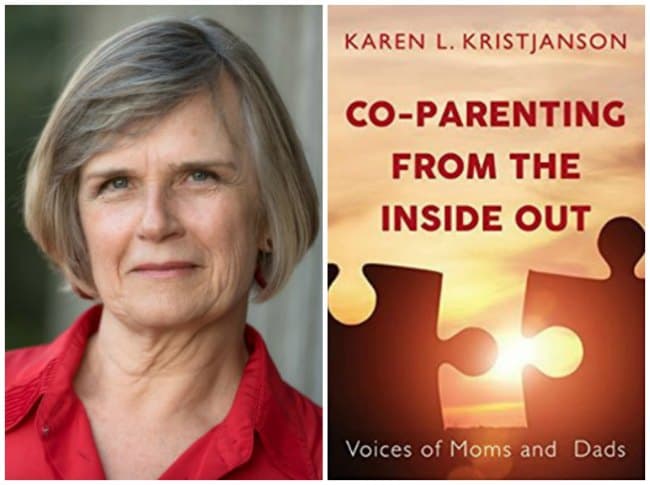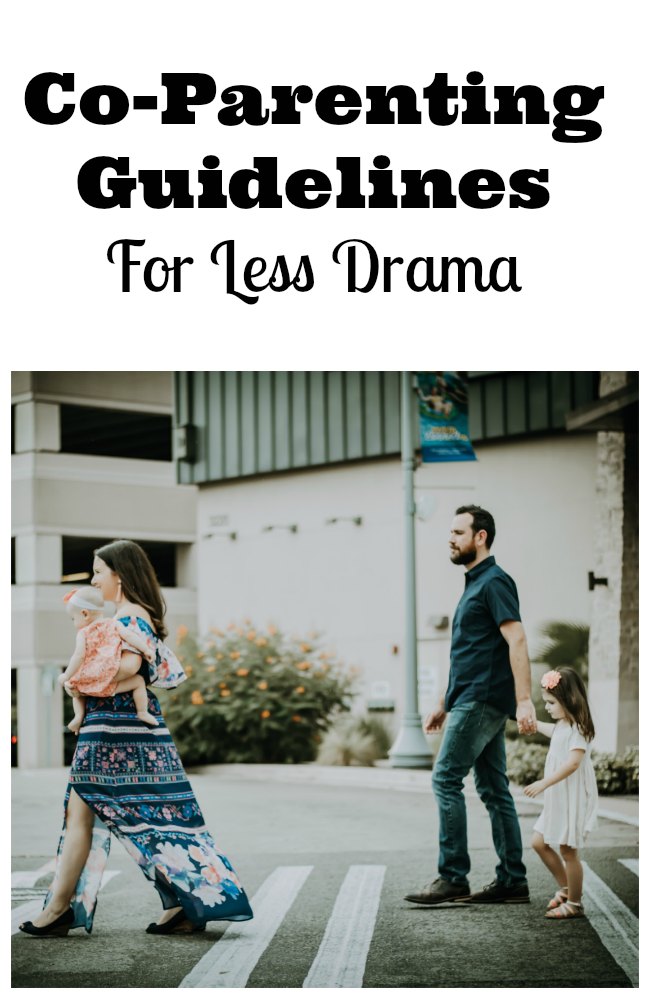First, you may be wondering exactly what is co parenting? Well, co-parenting is a concept based around sharing the duties of raising a child and can be within a marriage but the term is usually used in reference to separated, unmarried, or divorced couples. Co-parenting has multiple benefits for both the child and the adults involved when carried out successfully. However, it usually seems a very daunting task when navigating a marriage split. That is why it is great to take advantage of resources like counseling, classes, and/or co-parenting books. I am very pleased to share with you some co-parenting guidelines from Certified Life Coach and co-parenting expert Karen Kristjanson, who brings thirty years of experience and her own personal journey to her first book, CO-PARENTING FROM THE INSIDE OUT: Voices of Moms and Dads (affiliate link below). She does an amazing job of sharing the journey of many parents to learn to co-parent successfully, not only giving co-parenting advice but also showing real life stories that prove that though this can feel like a lonely time in your life, you are not alone.
12 Co-Parenting Guidelines
Karen L. Kristjanson’s book is based on a simple principle: The less drama in the co-parenting relationship, the more attention is available for raising the children. Makes sense because we all know what an emotional drain a conflict can be and that is why her co-parenting guidelines are so useful. Her book is a collection of life-coaching tactics, common sense actions, and personal experiences shared by the author and dozens of parents who are in complicated co-parenting situations and have found a way to work through it effectively. The book obviously shares so much more than I can share with you here but I hope this book excerpt shows you how helpful her co-parenting advice can be.
Co-Parenting Guidelines To Help You Navigate A Marriage Split:
Excerpt from CO-PARENTING FROM THE INSIDE OUT: Voices of Moms and Dads (Taken from Chapter 13)
By Karen L. Kristjanson
Reprinted with Permission
1. It gets easier
Some of the ease comes with learning that you survive. A massive shift can make you hold your breath, as if you have jumped into cold water. You aren’t sure that you’ll make it through. With time, you get used to the new temperature. You learn you can still breathe. You can not only tread water, but swim forward.
2. It’s not just about getting over the divorce
Getting through the divorce is only the first part of the job. Instead of this being a one-time task, with steps you accomplish and are done with, you may need to deal with waves of change for the next decade. If your former spouse takes actions like disparaging you, moving without notice, or being inconsistent in following agreements, you will likely feel ongoing anger and uncertainty. Use and strengthen your self-management skills, take care of yourself, and stay focused on the children’s needs.
3. Face your feelings
This may be the first time you’ve experienced such powerful emotions. You may not know how to stay with them. Don’t ignore or push away your feelings — or not for long — or you risk staying stuck in pain. Instead, give attention to whatever you feel about the divorce and your changing life. Accept that the feelings can be painful, and seek help, if needed, from counsellors, therapists, books, or support groups. If the marriage’s end echoes events from your past, there may be leftover guilt or sadness needing extra attention. If you stay in tune with your own feelings, you will more likely sense your children’s feelings as well. You’ll know if they need help.
4. Stronger parents mean stronger kids
Rising to the demands of co-parenting created new perspectives, skills, and confidence in almost all parents interviewed. Mothers’ and fathers’ development strengthened their parenting, and the children reaped the benefits of parents who were more confident in themselves and present for their kids. Your growth supports your children’s growth.
5. No one regretted getting help
Many parents wished they had done some things differently. They felt bad that they had made poor decisions or hadn’t seen warning signs in time. But no one was sorry for getting support from counsellors, coaches, financial advisers, support groups, massage therapists — whoever would bolster their inner resources. Even if it’s not comfortable, consider seriously your options for strengthening yourself in decision-making, acknowledging feelings, education, or getting along with others. There are countless resources, so give some a try. It won’t hurt, and it may make a difference for you and your children. Do whatever will nourish and expand you. This is one area where you have some control.
6. Seeing the big picture makes a big difference
Remember Chapter 2? The big picture included financial, mental, and physical health, as well as self-management skills and shared expectations. Even when both parents have high levels of self-management skills and similar expectations, co-parenting is challenging. When extra stressors are present, particularly special needs of a child or parent, or addictions, everyone involved needs to invest more ongoing energy. If this is your situation, accept that you will need support: ask for help and keep seeking whatever will enable you to keep going. If this is the situation of someone close to you, offer whatever support you can.
7. Co-parenting is dynamic
Your work situation changes; your ex-spouse needs to move; another child arrives; your children need different things from you and their other parent as they mature. Co-parenting may work with parents sharing time equally for two years, or eight years. At other times, one parent may have most of the time with the children. Expect changes and shifts.
8. Take time to make good decisions
You can’t know what’s going to happen, but you have to make decisions that will impact the future anyway. It is important to take time to explore and test your assumptions about what will be best for you and your children. Your anger, hurt, or fear can be so strong that stepping back to get more perspective is the last thing you want to do. It’s still important. This is particularly true in the first two years post-split, when it is hardest to see the children’s needs as distinct from your own.
9. Avoid drama, if you can
Some high-conflict stories included dramatic actions, like throwing the partner’s belongings outside or having loud arguments that the children could hear. Anger can be a valuable force that moves you to action, yet its unfiltered expression can also leave scars. While sometimes unavoidable, each dramatic action has the potential to escalate conflict. The more frequently open conflict occurs, the more it can impact your children, leaving them with memories they want to forget.
10. Learn forgiveness
No one parents, or co-parents, perfectly. Carrying blame and shame in your heart keeps you anchored in the past. Divorce brings intense feelings, and no one is at their best when navigating those shoals of hurt and anger. Notice when you screw up, and think about how to avoid doing that again. Then remember how many things you are doing right, and forgive yourself. If possible, with time (perhaps lots of time!), try to forgive your ex, too. You will feel lighter.
11. Nobody knows what’s next
You want so much to feel a sense of control or predictability where your children are concerned. Remember that not all unexpected events will be bad. Out of the blue, some shifts will improve your kids’ lives, your relationship with your ex, your career prospects — whatever. So when you gaze ahead into the uncertain future, try not to keep yourself only braced for hard things. Make sure to leave mental room for some good surprises, too.
12. Hope is important
As long as you believe that better things are possible, you can keep going.
I think these insights from Karen serve as really useful co-parenting guidelines. May they give you some foundational food for thought and help guide your mind in a positive direction. Which of these co-parenting guidelines were the ones you most needed to hear?


